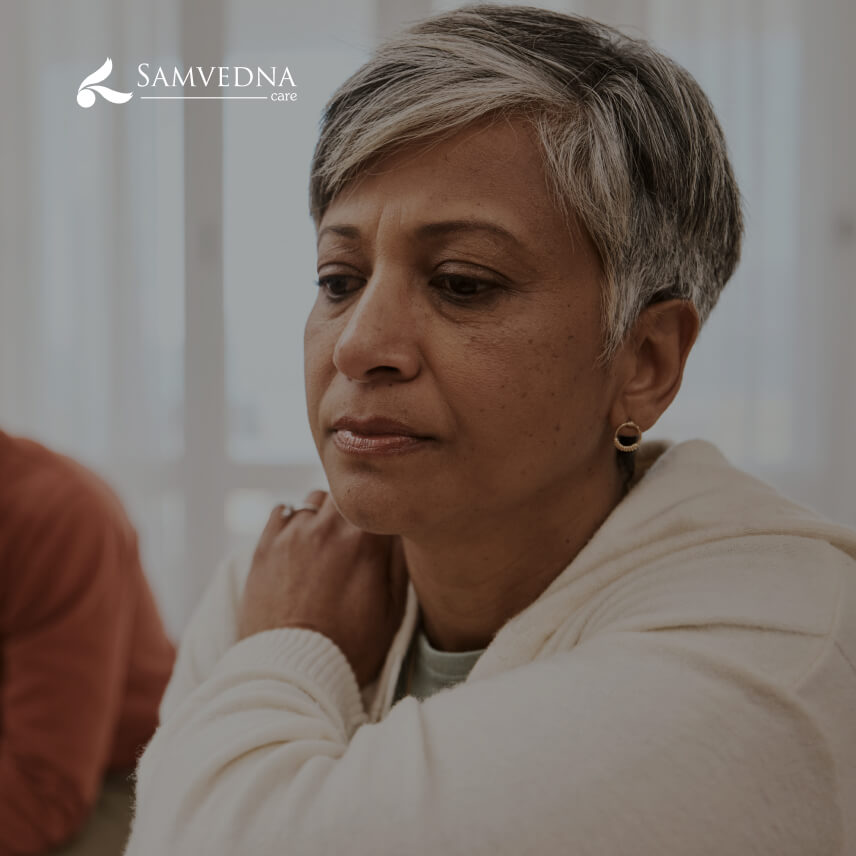Contact Us




You know that feeling when you’re sitting across from your parent or grandparent, watching them stir their tea a little too long, or stare out the window a little too often? Maybe they’ve started repeating themselves more. We want to believe it’s nothing. That’s just aging. But sometimes it’s not.
Sometimes, something deeper is going on, and we miss it, not because we don’t care, but because we don’t know what to look for. Mental health in older adults is one of those things nobody really talks about until it’s already become a crisis. And by then, it’s harder to reach them.
So let’s talk about it now.
We often associate old age with ailments, like arthritis, high blood pressure, and bad knees. But what about the invisible stuff?
There’s a strange silence that comes with aging. And inside that silence, a lot can go unnoticed, such as grief, anxiety, and even depression. The kind that settles in slowly and starts to look like a personality change. They may not cry for help. They may not even realize they need it.
They might just start withdrawing from conversations. Or losing interest in what used to bring them joy. Or forgetting things, not because their memory is failing, but because their heart is too full.
We’ve all heard it. We’ve all said it. But what if that flatness in their voice, that short temper, that hesitation to go outside or get dressed in the morning, what if that’s not just “old age”?
What if it’s loneliness wearing the mask of forgetfulness? Or sadness hiding behind “I’m just tired”?
It’s easy to miss. Especially when they don’t want to be someone’s responsibility. Or when they’ve grown up believing that emotions aren’t something you talk about.
But here’s the truth: mental health in older adults is just as important as physical health. Because the mind doesn’t creak and ache like the body does. It slips, silently.
Let’s keep it simple. Look for the changes that feel off. You’ll know them when you see them:
Listen to that whisper.
Here’s the part where most articles give you a numbered list.
But life doesn’t work in bullet points, does it?
So instead, here are some things to try. Some will work. Some won’t. That’s okay.
You don’t need a reason. Just sit. Be around. Fold laundry together. Watch their old TV shows, even if you hate them. It’s not about the show.
Not “How are you?” but “Do you ever feel lonely these days?” or “What part of your day do you enjoy the most?” or even “Are you sleeping okay?”
Take them to the market. Ask them to teach you something they know. Let them feel useful. Nobody wants to feel like they’ve been put on a shelf.
Sometimes, it’s not sadness, it’s a side effect. Or a mix-up. Or something simple that got missed.
They may not want therapy. They may not want to talk at all. That’s okay too. Just keep showing up. Keep being there. You’re planting seeds.
Caring for an older adult isn’t always about doing big things. It’s about seeing the small ones. The missing spark. The too-quiet afternoons. The dinner that’s barely touched. The sign is a little too long.
And when you notice it, don’t ignore it.
Mental health in older adults isn’t a niche issue. It’s everywhere. In every home. In every family.
Sometimes, all it takes is one person to see the invisible. To say, “Hey, I see you. I still need you. I still want you here.”
That one moment can mean everything.
Caring for an aging parent or grandparent isn’t easy. It’s emotional. It’s exhausting. And sometimes, it’s incredibly lonely.
You’re doing your best, juggling your own life while trying to make sure someone else doesn’t feel forgotten. But where’s the support for you?
Here are a few things that might help. Simple, real reminders for anyone walking this road.
There’s no gold medal for caregiving. Some days you’ll show up full of love and patience. Other days, you’ll be tired and snappy. That’s okay. What matters most is showing up. Not fixing everything.
You won’t be able to do it all. And you’re not supposed to. If you need to ask for help, take a break, or say no to something, it doesn’t make you selfish. It makes you human.
Don’t forget who you are. Go to that movie. Take that trip. Laugh with your friends. Your joy is not a betrayal, it’s fuel.
Talk about the past. Their favorite memories. Their biggest regrets. These aren’t just “nice moments”, they’re threads that keep the connection alive and remind them (and you) that they’re still very much here.
Whether it’s a sibling, a friend, a support group, or even a therapist, you need someone to lean on too. You can’t pour from an empty cup. Take care of your own mental health alongside theirs.
At Samvedna Care, we’ve seen this story unfold in so many different ways. The silence. The sadness. The slow pull away from life. We also know it doesn’t have to stay that way. We offer gentle, human help, such as counseling, dementia care, assessments, and support for families who want to care for the people who raised them. We also provide services for caregivers as we know how tough it it to handle all your things at the same time.
Mental health in older adults deserves tenderness, not checklists. It deserves presence. And it deserves hope.
Getting older doesn’t mean fading into the background. If someone you love is slipping away quietly, not in body, but in spirit, don’t wait for them to ask for help. They might never. Reach in. Sit down. Listen harder. And when you need backup, we’re here. Because nobody should grow old feeling invisible. And no act of care is ever too small.
Check out the services at Samvedna Care now.